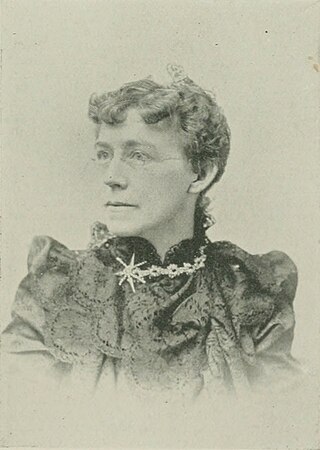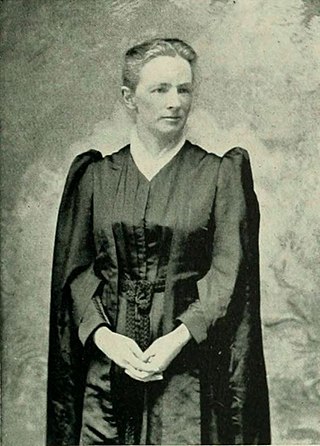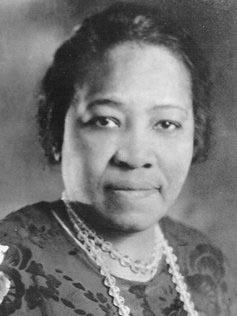
Estelle Turrell Smith (born October 30, 1854) was an American social reformer.

Estelle Turrell Smith (born October 30, 1854) was an American social reformer.
Estelle Turrell Smith was born in Forest Lake Township, Susquehanna County, Pennsylvania, on October 30, 1854. Her father's people were among the first settlers of Pennsylvania, emigrating at an early day from Connecticut. Her mother's family were Quakers. Her mother's maiden name was Gurney, and she was a descendant of Joseph John Gurney and Elizabeth Fry. [1]
In childhood Smith was thought old for her years, was fond of poetry and music, and delighted in the studies of natural science. She became early acquainted with the fauna and flora about her country home. Her studies commenced at home and were pursued in the Montrose Academy, Montrose, Pennsylvania. [1]
She started to teach when seventeen years of age, at the same time continuing her special studies, then among the masters of art and song. In 1875 she moved with her parents to Longmont, Colorado. She taught two years in the State Agricultural College in Fort Collins, Colorado. [1]
After the death of her husband, she became more deeply interested in the problems of woman's progress. Having means and leisure at her command, she devoted much time to the study and support of social reforms. Her devotion to the work of reform and her frequent contributions to the press soon won for her a place as a leader. [1]
Soon after her second marriage, she was elected president of the Polk County Woman Suffrage Society. She was an efficient member of the State executive committee for four years, and president of the State Woman Suffrage Association of Iowa. At her instigation a series of mothers' mass meetings was held in Des Moines. The large City Hall was filled again and again, hundreds of women taking active part. Smith was chosen president of the meetings. Through those meetings a bill regulating the property rights of women was presented to the State legislature. [1] In November 1896, she addressed the twenty-fifth annual convention of the association. [2]
In 1875 she became the wife of P. M. Hinman, secretary of the State Board of Agriculture, who died a few years later. [1]
In 1884 she became the wife of Dr. A. B. Smith, of Des Moines, Iowa. [1]

Lucy Stone was an American orator, abolitionist and suffragist who was a vocal advocate for and organizer promoting rights for women. In 1847, Stone became the first woman from Massachusetts to earn a college degree. She spoke out for women's rights and against slavery. Stone was known for using her birth name after marriage, contrary to the custom of women taking their husband's surname.

Carrie Chapman Catt was an American women's suffrage leader who campaigned for the Nineteenth Amendment to the United States Constitution, which gave U.S. women the right to vote in 1920. Catt served as president of the National American Woman Suffrage Association from 1900 to 1904 and 1915 to 1920. She founded the League of Women Voters in 1920 and the International Woman Suffrage Alliance in 1904, which was later named International Alliance of Women. She "led an army of voteless women in 1919 to pressure Congress to pass the constitutional amendment giving them the right to vote and convinced state legislatures to ratify it in 1920". She "was one of the best-known women in the United States in the first half of the twentieth century and was on all lists of famous American women."

Rachel Foster Avery was active in the American women's suffrage movement during the late 19th century, working closely with Susan B. Anthony and other movement leaders. She rose to be corresponding secretary of the National American Woman Suffrage Association and played a key role in organizing meetings across the country.

Flora Dunlap was an American social worker and social reform activist in Iowa. She served as the president of the Iowa Equal Suffrage Association in 1913. She headed the Roadside Settlement House in Des Moines, Iowa. Dunlap was the first woman to ever serve on the Board of Education of Des Moines. She was a friend of Jane Addams and a supporter of the Women's Suffrage Movement.

Mary Grew was an American abolitionist and suffragist whose career spanned nearly the entire 19th century. She was a leader of the Philadelphia Female Anti-Slavery Society and the Pennsylvania Anti-Slavery Society. She was one of eight women delegates, all from the United States, who were denied their seats at the London World Anti-Slavery Convention, in 1840. An editor and journalist, she wrote for abolitionist newspapers and chronicled the work of Philadelphia's abolitionists over more than three decades. She was a gifted public orator at a time when it was still noteworthy for women to speak in public. Her obituary summarized her impact: "Her biography would be a history of all reforms in Pennsylvania for fifty years."
Margaret W. Campbell was an American women's suffrage advocate.
Hannah Maria Conant Tracy Cutler was an American abolitionist as well as a leader of the temperance and women's suffrage movements in the United States. Cutler served as president of the Ohio Woman Suffrage Association and the American Woman Suffrage Association (AWSA). Cutler helped to shape the merger of two feminist factions into the combined National American Woman Suffrage Association (NAWSA).

Margaret Abigail Cleaves, M.D., was an American physician and scientific writer. She was a pioneer of electrotherapy and brachytherapy, instructor in Electro-Therapeutics New York Post-Graduate Medical School, President of the Women's Medical Society of New York, a Fellow of the American Electro-Therapeutic Association, a member of the Société Francaise d'Electrothérapie, a Fellow of the New York Academy of Medicine, Editor of Asylum Notes: Journal of Nervous and Mental Disease, 1891–2, a member of the Medical Society of the County of New York, a member of the American Medical Association, and a member of the New York Electrical Society.

Caroline Maria Seymour Severance (1820–1914) was an American abolitionist, suffragist, and founder of women's clubs.

Louise Frankel Rosenfield Noun was a feminist, social activist, philanthropist, and civil libertarian.

Mary Jane (Whitely) Coggeshall was an American suffragist known as the "mother of woman suffrage in Iowa". She was inducted into the Iowa Women's Hall of Fame in 1990.

Mary F. Thomas (1816–1888) was a pioneer American woman physician, abolitionist, and temperance and women's rights leader who advocated for women, as well as those in need. Born into a Quaker family, she grew up in Ohio and spent most of her life in Indiana. Thomas was an active member of the women's suffrage movement and a founding member of the Woman's Rights Association of Indiana, serving as a vice president and president of the Indiana organization. In 1859 she became the first woman to present a petition before the Indiana General Assembly, calling for passage of laws to provide property rights for married women and a women's suffrage amendment to the Indiana Constitution. At the national level she served a one-year term as president of the American Woman Suffrage Association. In the mid-1850s she was a coeditor of Mary Birdsall's national woman's rights magazine, The Lily, and later an associate editor of the Mayflower with Lizzie Bunnel and a contributor to Woman's Journal.

Elizabeth Morrison Harbert was a 19th-century American author, lecturer, reformer and philanthropist from Indiana. She was the first women to design a woman's plank and secure its adoption by a major political party in a U.S. state.

Annie Nowlin Savery was an American suffragist and philanthropist based in Des Moines, Iowa. She is known as a pioneer feminist and activist for woman suffrage. She began taking part in the woman suffrage movement in the 1860s, and became a leader in the county and state, speaking widely and helping establish organizations to support it.

Ella Hamilton Durley was an American educator, newspaper editor, and journalist. She was also a peace activist and supported woman's suffrage. Durley did noteworthy work on the Saturday Mail, a Des Moines weekly publication, but her professional life was mainly given to the Des Moines Daily News, of which her husband, Preston B. Durley and her brother, John J. Hamilton, with herself, were the principal owners. Under the pen name of "Judith Jorgenson", she conducted a column of stories of real life, "Around the Evening Lamp", for many years, and it was considered especially creditable.

Eliza Mason Tupper Wilkes was an American suffragist and Unitarian Universalist minister.
Nettie Sanford Chapin was a 19th-century American teacher, historian, author, newspaper publisher, suffragist, and activist. Chapin wrote mostly prose. She also wrote on Iowa history, and published several small books herself. While residing at Washington, D.C., for several winters, she wrote concerning society and fashionable Washington circles. In 1875, she began the publication of The Ladies Bureau, the first newspaper published west of Chicago by a woman. Chapin served as chair of the National Committee of the National Equal Rights Party.

Sue M. Wilson Brown was an African-American activist for women's suffrage. She was inducted into the Iowa Women's Hall of Fame in 1995.

Margaret Briggs Gregory Hawkins, worked as a schoolteacher and later became known for her activism on behalf of African Americans and women. She was inducted into the Maryland Women's Hall of Fame in 2021.
{{cite book}}: CS1 maint: multiple names: authors list (link) CS1 maint: numeric names: authors list (link)